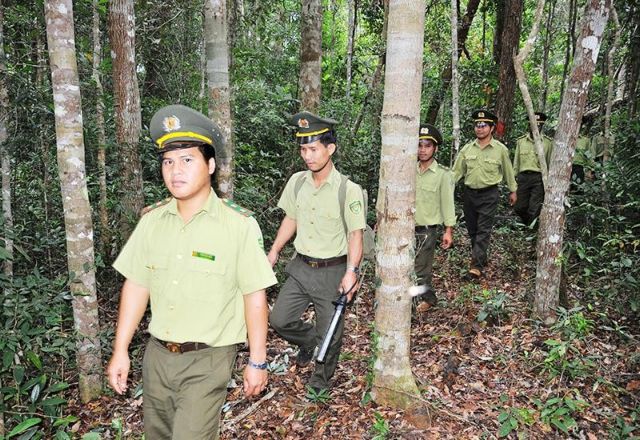 Society
Society


|
| Workers in Kon Chư Răng Natural Reserves patrolling the forest. — Photo nhandan.vn |
GIA LAI — Beyond the hardships and dangers, the forest rangers in the Central Highlands Tây Nguyên still patrol the forest day and night. But every ranger ponders the question, how to accomplish their mission and be there with their family and close ones.
Nguyễn Hữu Gia has been a forest ranger for 30 years. For Gia, there is no creek or mountain in Gia Lai that he has never been to, the Nhân Dân (People) newspaper reported.
"I'm 55 years old and in my 30 years as a ranger, I have been through a lot of challenges," said Gia. "Although many of my colleagues have moved on to other careers, I am still here because of my love of the forest."
"In my 30 years as a ranger, I have had only two Tết (Lunar New Year) holidays at home with my family," said 60-year-old ranger Trần Thái Nguyên of Kbang Ranger District in Gia Lai Province.
Tết is the time when loggers tend to commit heinous acts on the forest, according to Nguyễn Đức Thắng, a forest protection worker at Trạm Lập Forestry Company in Kbang District.
"It's the same every year - we tell our family to spend Tết without us, and when the work is done, we get "belated Tết" days off from the company."
But besides the lack of time spent with family, rangers face the possibility of never seeing their family again.
"Illegal loggers have tried to injure or kill us during our duty," said Kiều Thế Tình of Chư Yang Sin National Forest's Protection Section. "Sometimes they put spikes on our patrolling routes, or threaten our families directly."
Given the dangers and shortcomings of the job, the benefits are somewhat unequal. This has led to many experienced rangers to quit for other jobs. Some of them are former leaders of their Forest Protection Section.
"When loggers injure us or when we encounter accidents on duty, we are not entitled to the same treatments as other careers," said Tống Văn Thuyên, who has been a forest protection worker for 17 years. "Although the passion is still high, many of my colleagues have quit whenever a career-changing opportunity comes along."
"We sacrificed our blood to protect the forest against loggers," said Ngô Đức Liên of Chư Yang Sin National Forest's Protection Section. "But when we contact the Đắk Lắk Province's Department of Labour, Invalids and Social Affairs, they said the culprits must be captured, and a sentence from the court is needed for indemnification."
These barriers that prevent passionate forest rangers from doing their jobs are also addressed by Phạm Tuấn Anh, Director of the Đắk Nông Province's Department of Agriculture and Rural Development.
"Government policies must ensure adequate income for forest rangers, as well as ramp up measures to fine and reprimand criminals, in order for forest protection agencies and workers to do their job well," said Anh.
"The forest protection workers' jobs are hefty, but their powers are limited, for example, they cannot arrest people and take vehicles that commit violations," said Nguyễn Văn Sơn, Director of Lâm Đồng Province's Department of Agriculture and Rural Development.
"In terms of salary, the gross income of a forest ranger is inadequate compare to other occupations. Bonuses should be available for them such as experience bonuses, or bonuses for dangerous missions. Funds for equipment purchases and repair should also be available to further improve the protection work," said Sơn.
"We are currently petitioning for forest protection to be recognised as a special dangerous occupation," said Nguyễn Văn Hoan, Deputy Director of Gia Lai Province's Department of Agriculture and Rural Development. "However, when policy changes are ongoing, other local authorities must join hands and cooperate so that forest rangers are not alone in protecting the forest." — VNS




